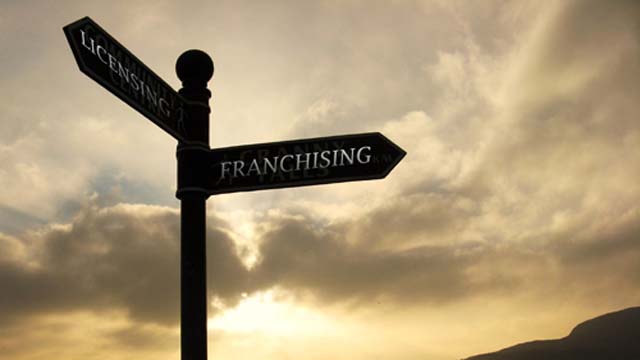Franchising or Licensing The Best Business Model for Brand Growth

Frequently, business owners considering growth through third-party distribution systems will be faced with the question of whether to license their business or franchise the business model and what the best course of action should be for growing their brand. Both concepts have many similarities and both live in a world of gray like many areas of business.
There are some key differences between the two structures and both are valid expansion models given certain business circumstances.
Franchising
Let’s start with franchising. A franchise is a business model which comprises three key elements – use of the brand, use of the business system, and payment of a fee for the use of these two together. Many refer to franchising as having a three-legged stool that includes these three elements.
What is it?
Franchising is when you allow the use of your business name and business system for the payment of a fee upfront and/or ongoing.
Why use it:
- Allows someone to use your name and trademark
- You are paid a fee of some kind, generally, it is an upfront fee plus an ongoing royalty payment such as a percentage of sales or a fee per product sold
- Can be a more cost-effective solution to expand initially
- Allows operational control for consistency
- Provides an exit strategy for the business
- Common branding and marketing for brand awareness
Common Uses:
- Used for business expansion to grow a business model in a wide array of industries including service, food, lodging, retail, professional services, medical, and many others
- Great use for manufacturing and distribution businesses
- Converting other companies into your franchise
- Used to help co-brand other existing similar types of businesses
Limitations:
While you have the ability to enforce operational requirements and consistencies, only the franchisee is able to manage employees.
Licensing
On the other hand, licensing comes with much fewer regulations and stipulations associated with the process. It also does not afford the licensor as much control or influence on the licensee’s business.
What is it?
Licensing is when you allow the use of your business name and/or marks for a fee.
Why use it:
- Allows someone to use your name and trademark
- You are paid a fee of some kind, generally, it is an upfront fee and could include an ongoing royalty payment such as a percentage of sales or a fee per product sold under the brand name
- Can be a more cost-effective solution to expand initially
- Common branding and marketing for brand awareness
Common Uses:
Often used for the sale of products, an example might be a toy manufacturer licensing the rights to use Disney character names and images
Sometimes is used as an alternative expansion model to achieve brand awareness and get more market coverage quickly
Used to help co-brand other existing similar types of businesses or in Master arrangements where a brand is licensed to a third party in other parts of the world (International Master Franchise)
Limitations:
The greatest limitation of licensing is its ability for you as the licensor to be able to control the operating procedures of the business operation.
When buying a franchise, an entrepreneur should look at the balance sheets and bottom line and compare it to similar franchises in similar areas. Also, they should perform a name-brand availability search and investigate Intellectual Property issues such as patent ownership.
Anyone selling a franchise should be sure to protect their Intellectual Property and create comprehensive work manuals and maintenance programs. Anyone selling a license should ensure that their Intellectual Property is protected by law and specify what rights it grants the licensee.
Both licensing and franchising are viable expansion vehicles; there is no wrong answer to which is best for a particular business model. In my experience, the companies that should franchise are ones that are concerned about the quality of their brand as it is represented in a given market.
Franchising allows the franchisor to dictate most, if not all of the operational responsibilities and standards to be followed by Franchisees. Licensing on the other hand is a much looser relationship and will include only either the brand OR the business model, not both.
Before taking this step forward into either distribution system, I would recommend speaking with someone who could reference experience in developing third-party distribution systems and can help in evaluating a given business model as to whether Licensing or Franchising is the best growth vehicle.
FMS Franchise has provided you with two additional educational paths to explore above. You can download the franchise expansion guide or take our quick business model assessment to understand more about what option is best for your business.
Interested in Franchising your business? Contact us today for a free consultation.
Christopher Conner has spent the last decade in the franchise industry working with several hundred different franchise systems in management, franchise sales, and franchise development work. His experience ranges across all fields of franchise expertise with a focus on franchise marketing and franchise sales but includes work in franchise strategic planning, franchise research, and franchise operations consulting.
Christopher has worked with multiple international franchises and licensed organizations throughout the United States, the Middle East, India, and Europe. He has an MBA in Finance and Marketing from DePaul University in Chicago and a Bachelor’s Degree from Miami of Ohio.
Franchising USA is a monthly digital publication bringing you all the latest news, expert advice, and information from the world of franchising. Written with franchisees in mind, Franchising USA is a valuable resource for legal and financial advice, marketing and business information, as well as franchise profiles and in-depth features.
- How does the Stark Law work in Franchise Business Models: Legal Considerations and Compliance - January 25, 2024
- Jollibee Franchise: A Flavorful Journey Through History - January 25, 2024
- How Franchisors Tackle Daily Challenges in Business Management - January 23, 2024

